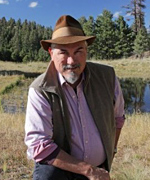 —Alan Dulaney
—Alan Dulaney
No matter where they live on the planet, human populations dependent on surface water from major rivers become increasingly concerned when they perceive a threat to the source of their water supply.
Ethiopia began building the Grand Ethiopian Renaissance Dam (GERD) in 2011. GERD will store the waters of the Blue Nile, a major tributary to the Nile River. Egypt has been dependent on the Nile River for millennia, literally since the dawn of civilization. Ethiopia is the upper basin, the source of water, while Egypt is the lower basin with ancient and heavy demands. Ethiopia intends to start filling their new reservoir in July. Egypt, with 100 million people and already experiencing periods of water scarcity, foresees diminished flows in the Nile of up to 14% for several years. Egypt is moving from concerned to worried and angry; Ethiopia’s position can be described as adamantine.
Starting in 1891, Egypt has been party to 15 agreements with other countries in the Nile Basin that addressed the development of the Nile River (and many more going back over the centuries). A 1929 colonial-era agreement provided the basis for some regulation of the Nile, but it is not clear that Ethiopia was a party. Additional bilateral terms in 1959 allocated annual quotas between Egypt, Sudan, and Ethiopia (again, not a party), thus paving the way for Egypt’s Aswan Dam project. Negotiations between Egypt, Sudan, and Ethiopia on GERD and the Blue Nile began years ago, and most recently resulted in a draft agreement brokered by the United States in February 2020.
The Washington agreement contained mechanisms for slow filling of the reservoir, measures to halt filling during droughts, and long-term operating rules. Ethiopia was not happy with the agreement, never signed it, and came back with its own proposals which mandated Ethiopia’s total control over GERD, the hydroelectric power it will generate, and the water itself, irrespective of Egypt’s historical claims. Egypt regarded the Ethiopian paper as unacceptable, and negotiations broke down. On June 17 Egypt took the entire matter to the United Nations Security Council for resolution. Egypt’s hope is that the Security Council will lean heavily on the World Bank, which funded GERD, to halt the filling process and force more negotiations.
It seems that there are many situations where the upper basin of a major river system, less populated or developed, begins to question why the lower basin, often densely populated, wealthier, and dependent upon the water from the river, should not share that resource more equitably. Disputes between Turkey and Iraq, concerning the Ilisu Dam on the Tigris River, between India and Bangladesh, concerning the Ganges River, and between China and Vietnam, concerning the Mekong River, are all related to upper basin origins of water. Those are just some big ones; many other smaller rivers are also the subject of disputes. And then there is the Colorado River system in the western United States, where Upper Basin states, not quite so populated, are on one side of the Glen Canyon Dam and the Lower Basin states, with well-established large demands, are on the other.
The process of negotiation has existed in the western United States for a long time, and was recently polished by the Drought Contingency Plan. Government officials, water professionals, and hydrologists are looking at the current megadrought as a major impetus to complete the next set of shortage-sharing agreements before 2025. Because the Colorado River Basin states know how to negotiate acceptable agreements, success is a realistic expectation.
Water is not for fighting over—unless you have your own army. Foreign ministers are busily denying that any military option is contemplated. But there is no movement towards re-starting talks, and GERD will start storing water within weeks. Seeing this, generals have made remarks from a different perspective. Tensions are rising, another reason Egypt chose to involve the Security Council. The soft rustle of sabers can be heard across East Africa, and it is all about the Nile, that most ancient of water sources.